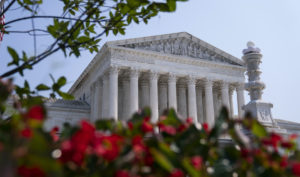
The Supreme Court invalidates race-based college admissions programs, it affirms state courts’ oversight of electoral maps, and more…
IN THE NEWS
The U.S. Supreme Court, in a 6-3 decision, held that admissions programs that consider race at Harvard College and the University of North Carolina (UNC) violate the U.S. Constitution’s Equal Protection Clause. Writing for the majority, Chief Justice Roberts wrote that each “student must be treated based on his or her experiences as an individual—not on the basis of race.” Justice Sotomayor, writing in dissent, argued that the majority undermined the promise of racial equality at the heart of Brown v. Board of Education and other desegregation cases. And Justice Jackson, in a separate dissent in the UNC case, contended that the university “more accurately assesses” merit by accounting for race in its admissions decisions.
The Supreme Court, in another 6-3 decision, rejected the controversial independent state legislature theory. Proponents of the theory argued that the U.S. Constitution’s Elections Clause dictates that state legislatures have an unreviewable power to govern federal elections. North Carolina Republicans argued that the state’s supreme court had usurped the state legislature’s power by invalidating the Republican-drawn electoral map following the 2020 Census. The U.S. Supreme Court held that the Elections Clause does not grant exclusive and unreviewable authority to state legislatures to regulate federal elections. Voting rights advocates celebrated the decision because, under the independent state legislature theory, state legislatures could operate unchecked when drawing electoral maps and setting rules in federal elections.
The Supreme Court, in an 8-1 decision, ruled that the Biden Administration can set priorities for determining which non-U.S. citizens pose a threat to national security. The Administration’s immigration guidelines issued in 2021 by the Department of Homeland Security sought to focus on “national security, public safety and border security.” Louisiana and Texas argued that the guidelines contradicted the federal government’s mandate to arrest and detain noncitizens with state criminal convictions. The Supreme Court rejected Texas’s and Louisiana’s challenges to the Biden Administration’s border policing, holding that the states lacked standing to sue. The Court explained that “if the court greenlighted this suit, we could anticipate complaints in future years about alleged executive branch under-enforcement of any similarly worded laws.”
New York Governor Kathy Hochul signed a bill to safeguard access to transition-related medical care for transgender minors. The law prevents New York courts from enforcing other states’ laws that could lead to a child’s removal from their parents if they are provided with gender-affirming care. It also prohibits New York courts from treating transition-related care for minors as child abuse unless the care meets the state’s definition of abuse. New York joins 11 other states and Washington, D.C., in having similar “safe haven” laws. Hochul stated that “as the birthplace of the modern movement for LGBTQ+ rights, New York is proud to protect, defend and affirm our LGBTQ+ community.”
The North Carolina Senate and House voted to override Governor Roy Cooper’s veto of a state agriculture bill. The legislation restricts wetlands that the state can regulate to those considered “waters of the United States,” and it specifies that wetlands do not include prior converted cropland. Cooper argued that the bill would undermine legal protections for wetlands, resulting in “more severe flooding for homes, roads and businesses, and dirtier water” for people in the state.
The Federal Highway Administration approved the nation’s first traffic congestion pricing program. The approved program, designed to reduce traffic and pollution in New York City by funding improvements to mass transit, will take effect once the Metropolitan Transportation Authority (MTA) determines the final rates. At that time, drivers who enter Manhattan south of 60th Street will be charged a fee at new tolling locations. Under one rate proposal, motorists could be charged $23 each for a rush-hour trip into Midtown and $17 during off-peak hours. New York Governor Hochul stated that “congestion pricing will reduce traffic in our crowded downtown, improve air quality, and provide critical resources to the MTA.” The MTA stated that it expects congestion pricing to generate $1 billion annually and make getting around New York more equitable by levying fees on drivers who can afford to pay them and helping lower-income communities that rely on mass transit.
The U.S. Environmental Protection Agency (EPA) issued a final rule establishing biofuel requirements for 2023 to 2025. The final rule is intended to strengthen U.S. energy security, support the U.S. rural economy, and expand the production of low-carbon fuels. EPA noted that it also seeks to strengthen U.S. energy security by reducing U.S. reliance on foreign sources of oil by roughly 130,000 to 140,000 barrels of oil per day from 2023 to 2025. EPA Administrator Michael S. Regan said that the final rule “supports domestic production of cleaner fuels and helps reduce greenhouse gas emissions.”
WHAT WE’RE READING THIS WEEK
In a Yale Journal on Regulation article, Alexander I. Platt, an associate professor at the University of Kansas School of Law, argued that whistleblower programs, although widely praised, suffer from efficiency and accountability deficits. Platt identified these deficits as stemming from the deluge of whistleblower tips that agencies with whistleblower protection programs must sift through. Platt found that tipsters represented by lawyers—especially experienced lawyers and those who previously worked at the Securities and Exchange Commission—outperformed most other tipsters.
In an Urban Institute report, Laura Skopec, a senior research associate at the Institute, and Robert Berenson, an Institute fellow, argued that the Medicare Advantage Quality Bonus Program (QBP) established under the Affordable Care Act overpays health care organizations without improving quality of care to beneficiaries. Skopec and Berenson explained that most Medicare beneficiaries are enrolled in Medicare Advantage, and beneficiaries under the Quality Bonus Program have become a significant source of revenue for health insurers, totaling over $10 billion in payments in 2022. Despite a 10-year commitment to paying bonuses to Medicare Advantage plans for improved quality of care, Skopec and Berenson’s research suggests that Medicare Advantage beneficiaries did not receive a higher quality of care compared to traditional Medicare programs. Skopec and Berenson recommended that an independent body should be established to give Congress advice on how policies protect beneficiaries from “poor plan administration.”
In an R Street Institute publication, Philip Rosetti, Resident Senior Fellow of Energy, analyzed a division that has arisen between pro-clean energy groups and conservationists over whether there should be new developments in regulating clean energy. Rosetti explained that this division stems from the unavailability of sufficient minerals to turn away entirely from fossil fuels. Rosetti criticized the inconsistent political treatment of mining projects, highlighting how some projects receive Defense Production Act subsidies or loan guarantees, while others do not. Rosetti urged the use of more consistent and clear environmental review processes to increase focus on environmental compliance. Rosetti concluded that regulatory reform can decrease dependence on foreign suppliers and restore a focus on environmental compliance.
EDITOR’S CHOICE
In an essay in The Regulatory Review, Guy Uriel-Charles, Charles Ogletree, Jr. Professor of Law at Harvard Law School, contended that making access to voting an option for all requires recognizing that political and racial equality are inextricably linked. Uriel-Charles discussed the 1960 Supreme Court case Gomillion v. Lightfoot, where the Supreme Court held that the 15th Amendment barred redrawing the Tuskegee, Alabama, electoral map in a manner that was not explicitly designed to exclude Black voters, but had the effect of doing so. Uriel-Charles explained that Gomillion asks courts to respond to the intersection of structural racial and political subordination. Uriel-Charles recommended congressional and judicial oversight of both political and racial inequality, because this approach recognizes that the two are symbiotic.



